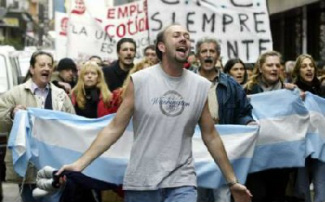 Argentinians protest economic policies of the IMF. Argentinians protest economic policies of the IMF. Tags: capitalism, economic sociology, globalization, political economy, social mvmts/social change/resistance, theory, argentina, deregulation, double-movement, embeddedness, karl polanyi, laissez-faire capitalism, neoliberalism, regulation, subtitles/CC, 00 to 05 mins Year: 2004 Length: 5:30 Access: YouTube (start 3:05; end 8:35) Summary: In his famous book, The Great Transformation, Karl Polanyi argued that, throughout human history, economic decisions have always been embedded within society (i.e., they have been shaped and constrained by social values and relationships). However, with contemporary capitalism, the economy has become disembedded from society through laissez-faire capitalism, which is promoted by many liberal economists and capitalists, and meant to disregard social factors. While this system has created tremendous wealth, it is unable to regulate itself and is not a "natural" economic order, as its proponents claim. In actuality, if laissez-faire capitalism is left to itself, it creates so much social dislocation that it would destroy itself, and thus it inevitably sparks resistance to it. This resistance leads to movements to regulate capitalism to varying degrees, from reforms that put constraints on capitalism (e.g., the New Deal) to more radical changes to the capitalist structure (e.g., socializing the economy through a centralized state), thus re-embedding the economy within society. This excerpt from the documentary, The Take (start 3:05; end 8:35), illustrates this double-movement between efforts at regulation and de-regulation. With a focus on Argentina, it shows how systematic deregulation in the 1990s, and the problems it created, sparked massive resistance. The deregulation (which itself required state action) included selling off public assets, eliminating currency controls, and implementing a variety of business-friendly policies. Supported by the IMF, these neoliberal policies crashed the economy in 2001, resulting in massive unemployment and poverty rates exceeding 50%, which sparked spontaneous protests throughout the country. Like similar double-movements throughout the world, the resistance sought to re-regulate the economy, and re-embed the economy in society, to meet vital social needs. The rest of the documentary shows that, in this case, the social response included a movement of workers that occupied and began running factories on their own. Submitted By: Paul Dean
2 Comments
Manuel Franco
7/29/2023 02:09:56 am
I just want to say Thank You to everyone who supported me through the years. My name is Manuel Franco, New Berlin, Wisconsin. My story of how I won the Powerball lottery of $768.4M is a bit of a tale. I have been playing Powerball tickets for 6 years now since I turned 18. I bought my first ticket on my 18 birthday. I was feeling very lucky that day because I had contacted Dr. Odunga Michael to help me with the winning Powerball numbers. I really had that great great feeling that I looked at the camera wanting to wink at it. I only did a tiny part of it and trusted him. He gave me the numbers after I played a couple other tickets along with it for $10. I checked my ticket after the winnings came online and saw the numbers were correct including the Power play. I screamed for about 10 minutes because it felt like a dream. I had won $768.4M. You can check my winning testimony with the lottery officials just with my name search. Thank you Dr Odunga. Well, his email is [email protected] and you can also call or Whats-app him at +2348167159012 so you guys can contact him
Reply
mark hold
7/7/2024 03:34:44 pm
Herbal Penis Enlargement product is 100% guaranteed to Enlarge and get a better ERECTION, the reason why most people are finding it difficult to enlarge Penis is that they believe in medical reports, drugs and medical treatment which is not helpful for Penis Enlargement. Natural roots/herbs are the best remedies which can easily Enlarge your Penis permanently Contact Dr MOSES BUBA via Email: [email protected] or via WhatsApp: +2349060529305. for Natural root and herbal remedies put together to help Enlarge manhood and Erect healthily. I also learn that Dr MOSES BUBA also can cure other types of diseases, HEPATITIS B,DIABETICS,CANCER,HPV,LOW SPERM CAM, HIV/STDS, FIBROSIS LOST OF WEIGHT, BREAST ENLARGEMENT, HIPS and BUMS ENLARGEMENT etc .
Reply
Leave a Reply. |
Tags
All
.
Got any videos?
Are you finding useful videos for your classes? Do you have good videos you use in your own classes? Please consider submitting your videos here and helping us build our database!
|
 RSS Feed
RSS Feed
